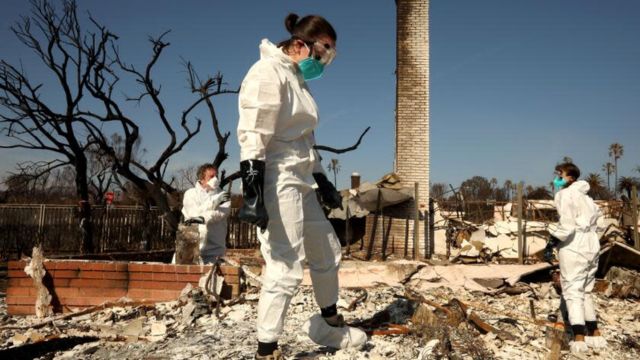Judy Zweig lost nearly everything in the Palisades fire, including her children’s baby pictures, her wedding album, and all her valuable jewelry that was kept in a safe.
A 66-year-old dental nurse wanted to enjoy her retirement in her Pacific Palisades home, but now she and her husband will use their savings to rebuild it from scratch.
“We were very close to having financial freedom and a less stressful life. This has taken away our past and our history, and it’s also stealing the future we dreamed of,” she said. “I’ve never built anything from the ground up before, and I’m starting this at almost 70 years old.” “This isn’t how I wanted to live my life.”
On January 20, Zweig’s husband, Stefan, took a day off work and went to the old Westside Pavilion, which is now a recovery center for emergency assistance run by FEMA. He met with a FEMA officer, who requested his Social Security number, birth date, and location.
The cop told him that someone else had already registered using his information, but they provided a different phone number and email address.
“It felt like a punch to the stomach,” said Stefan Zweig. “It was very frustrating, and it was just another step I had to take to get help.”
Judy Zweig said they made a claim with FEMA because they were victims of identity theft and fraud. Their daughter, a lawyer, helped them complete the paperwork and suggested they contact the Federal Trade Commission and the Department of Justice. The next day, Judy Zweig took a break from work and went to the disaster assistance center. When she tried to register for help again, the FEMA officer told her that her home was currently “locked” and that her family would have to wait until their case was sorted out.
Judy Zweig said that the FEMA officer doing her screening mentioned he had seen five cases of fraud. “This is a big problem for FEMA. One reason is that people can sign up online, which allows some to cheat and get benefits that others really need.”
Brandi Richard Thompson, a spokesperson for FEMA, mentioned that while they don’t have specific statistics on FEMA fraud cases, it’s normal for identity theft and fraud to happen after a natural disaster. She didn’t know if there were more fraud cases related to the Los Angeles County wildfires than with other tragedies.
Experts say that identity thieves can get stolen personal information, like Social Security numbers, and use it to apply for FEMA funds online.
Thompson said, “It’s not unusual for this to occur after a disaster, but it doesn’t happen with every registration.”
In 2021, about 24 million people were affected by identity theft, according to the Bureau of Justice Statistics. By Wednesday, there were over 121,000 FEMA applications related to the wildfires, according to Thompson.
If someone finds out there is already a claim linked to their address, whether because of fraud or another issue, they should contact FEMA. They can do this by calling or visiting a disaster recovery center to help fix the situation, according to Thompson. They should bring their ID to the center or upload it to their online account.
Once that information is filed, FEMA has 30 days to review the case and get back to the individual with an update, she said.
There are two main FEMA aid programs for wildfire victims. One offers up to $43,600 for housing help, which covers home repairs, replacements, rental costs, and lodging expenses. There is another option for up to $43,600 that covers help with personal belongings, medical and dental bills, funeral costs, and transportation.
The registration deadline for help from FEMA and the Small Business Administration is March 10. This aid is available for homeowners, renters, nonprofits, and businesses.
Thompson said the agency is working to improve its ability to detect and avoid fraud by using identity checks, analyzing data, and collaborating with federal, state, and local authorities. FEMA teams up with police to look into reports of scams.
Fraud and identity theft have been ongoing issues, but they have become more common with the rise of the internet, according to Ruben Davila, a USC professor and lawyer who has dealt with cases of financial fraud. Fraudsters can easily get other people’s personal information, like Social Security numbers, addresses, and birth dates. They can then apply for FEMA funds online without needing to show any ID in person.
Davila mentioned that it has been difficult for government agencies to quickly and accurately give large sums of money to the right people, especially during the COVID-19 pandemic.







Leave a Comment